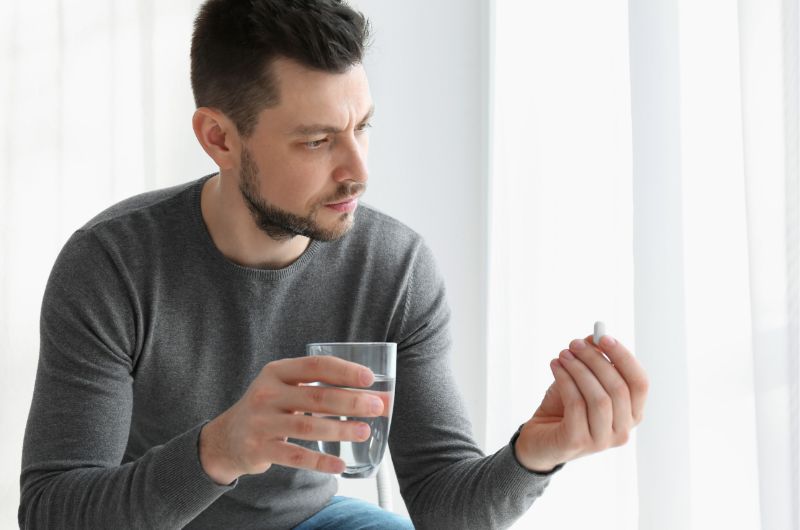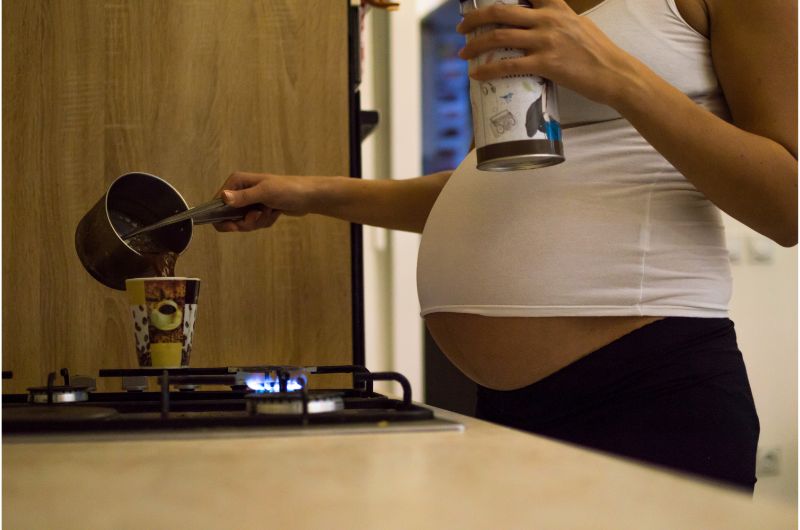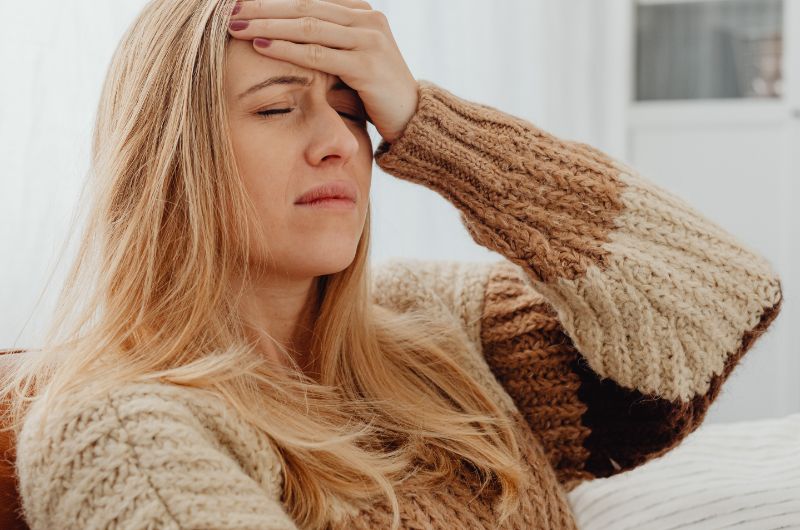Caffeine is a common psychoactive substance that can benefit your body when taken wisely, increasing your alertness, concentration, and energy. However, when consumed in excess amounts, it can cause chronic headaches, insomnia, and anxiety, and your body also becomes unhealthily dependent on it. To safely detox from caffeine, slowly reduce consumption, drink more water, switch gradually and steadily to decafs, and adjust your habits (like exercise and adequate sleep) that boost your energy naturally.
Caffeine is the most popularly consumed psychoactive substance in the world. Roughly 90% of all adults on Earth take caffeine daily. It is a stimulant commonly contained in coffee, tea, energy drinks, sodas, chocolates, etc.
Caffeine is a whitish, bitter substance in many plants, like tea leaves, cacao pods, and coffee beans. According to the United States Food and Drug Administration (FDA), caffeine is a drug and a food additive.
Synthetic caffeine is also added to manufacturing foods, medicines, and supplements.

When wisely administered, caffeine reduces fatigue and helps you stay alert and focused. It boosts your energy and lowers fatigue.
However, when abused or used carelessly, addiction may set in, and you may experience persistent headaches, high blood pressure, insomnia, and dehydration.
How much caffeine is too much?
An intake of up to 400 mg of caffeine daily is moderate and would not be a problem for most healthy adults. However, it is essential to note that people react differently to caffeine intake.

This difference depends on gender, size, and sensitivity.
Thus, if a person is highly sensitive to caffeine consumption, even intake of moderate amounts can lead to feelings of anxiety, insomnia (sleeplessness), restlessness, and rapid heartbeat.
Generally, health professionals and nutritionists agree that a daily intake of more than 600 mg of caffeine—equal to 4–7 coffee cups—is unhealthy.
Symptoms that indicate too much caffeine consumption
The following are the symptoms that may surface from too much caffeine intake:
- Headache
- Insomnia (difficulty in sleeping)
- Restlessness
- Nausea
- Anxiety
- Jitteriness and dizziness
- High blood pressure
- Dehydration
- Fast or abnormal heartbeat
- Adrenal insufficiency
An acute caffeine intake will likely expose you to neurologic and cardiac complications and even death.
People who should watch their caffeine intake

The truth is it’s not safe for anyone to consume too much caffeine. However, the following category of persons may particularly want to stay away from a caffeinated diet:
- People with sleep disorders
- Pregnant women
- Breastfeeding mothers
- Children and adolescents
- People under medications that may produce adverse effects when combined with antibiotics and certain stimulants
- People with chronic headaches
- Ulcer patients
- People suffering from anxiety
- People with high blood pressure
Is caffeine addictive?
Many people develop a tolerance to caffeine over time as their body adapts and gets accustomed to caffeine consumption.
As time passes, such persons might discover that they have to increase their intake of caffeine for it to function effectively, keeping them alert and boosting their concentration.
Caffeine is hard to quit as we tend to develop a powerful dependency on it for psychological and physiological reasons.
It is generally viewed that your body can be caffeine-dependent. Still, it is technically not regarded as an addiction in the manner in which your body can be addicted to illicit stimulants like meth and molly (MDMA).
What are the symptoms of caffeine withdrawal?
You are likely oblivious to your body’s dependency on caffeine until you miss a mug or attempt to wean yourself off it.
Caffeine withdrawal symptoms constitute a medical condition that anyone who takes caffeine can suffer incessantly.
On average, the higher your consumption of a caffeinated diet, the harsher your withdrawal symptoms will be.

Withdrawal symptoms generally surface 12–24 hours after quitting caffeine and can persist for up to 2 to 9 days, reaching their peak between 24–51 hours after quitting.
If you have come to be caffeine-dependent, suddenly quitting it can result in severe withdrawal symptoms like:
- Migraine or throbbing headaches (the most typical caffeine withdrawal symptom)
- Tiredness and fatigue
- Sluggishness
- Drowsiness (during the day)
- Nausea
- Irritability
- Constipation
- Difficulty in concentrating
- Depression
- Anxiety
- Low energy
- Tremors
What are the dangers of extreme caffeine withdrawal?
Extreme caffeine withdrawal can cause several psychological and physiological complications. These complications may include migraines, tiredness, drowsiness, irritability, nausea, anxiety, depression, and concentration difficulty. Muscle aches and palpitations may also surface in certain instances.
These very harsh withdrawal symptoms can affect your ability to perform optimally in your daily life. Also, the acute inconvenience suffered during extreme caffeine withdrawal increases the urge and danger of relapsing into high caffeine intake.
Tips for detoxing from caffeine safely
While caffeine withdrawal symptoms are usually temporary, they can be unsettling and make you feel so much discomfort.
The good news is that there are ways to detox from caffeine while mitigating the likelihood of experiencing these displeasing symptoms.
Use the following tips to minimize the severity of or altogether avoid caffeine withdrawal symptoms.
1. Gradually reduce your caffeine intake
Don’t just go ahead to stop at once, overnight.
The weaning process must be slow and gradual, or else you will most probably experience unpleasant withdrawal side effects that would make you relapse and begin consuming highly caffeinated drinks, diet, and medication again to make the symptoms disappear.
This takes you back to square one of your dependency. If you’re on a prescribed medication that includes caffeine, discuss with your healthcare provider about possible alternatives.
It took me about 3 weeks to reduce my caffeine intake and a little more time from complete withdrawal. I would never say it was easy.
Headaches, sluggishness, and fatigue gave me a tough competition but strong will, and commitment made me the winner.
2. Drink more water
Water is another effective way of detoxing from caffeine. Successfully toning down the quantity of caffeine you consume would require that you gradually cut down on your daily intake of coffee, energy drinks, tea, and soda.

Replace such diets with water; the latter is healthier and an ideal substitute for the desire to take liquid.
Also, water dilutes the caffeine in the body and keeps it hydrated and energized, making it needless to use caffeine again.
3. Lean on decaf
If you drink coffee often, slowly and steadily move from taking full-strength coffee to decaf.
You can start by switching steadily between both, then gradually take more decaf until you methodically make your consumption of full-strength coffee taper off.
You can supplement or mix your caffeinated drink with half or a quarter decaf—half decaf and half full-strength coffee. Then, daily, reduce the quantity of regular coffee further while increasing the quantity of decaf.
Spreading your caffeine detoxing steadily and strategically over two to three weeks will help you change your caffeine consumption habits without leaving any withdrawal symptoms.
4. Make soothing changes
Upon delving deeper into the psychology of your consumption preferences, you might discover that it is the feeling of taking the caffeine that your body craves rather than the caffeine itself.
Hence, you can figure out ways to continue your caffeine-intake routines with caffeine-free drinks and diets.
For instance, if you cherish the feeling of taking a hot cup of coffee in the cool of the evening, try substituting it with a hot mug of tea or a hot mug of decaf herbal tea at the same time of the day.
5. Bump up energy naturally
If your energy levels lower after caffeine withdrawal, you can employ natural energy boosters like regular exercise and nutrient-dense diets. Additionally, get adequate sleep.
Getting the medically recommended nightly sleep of 7 to 9 hours would boost your energy levels and help your body fight fatigue and drowsiness.
Caffeine in pop culture
Today, caffeine is firmly rooted in pop culture and enjoys predominant use in several spheres of life. Its popularity is owed to enterprises like Starbucks—the world’s largest coffeehouse chain, established in 1971.
Starbucks and other coffeehouse chains made coffee consumption a voguish thing. However, aside from the role of coffeehouse chains, caffeine’s popularity in pop culture also manifests in movies, TV shows, music, art, and literature, where coffee is often depicted as an emblem of vibrancy and energy.
All over the world today, people’s consciousness and conception of coffee have changed. They no longer see it as an ordinary beverage but a way of life and an emblem of modernity.
FAQs
What are decafs?
The term “decaf” is short for decaffeinated coffee or decaffeinated tea; that is, coffee or tea with most or all of its caffeine removed.
What other substances are addictive, like caffeine?
Alcohol, tobacco, and marijuana are addictive stimulants like caffeine
How long will caffeine stay in my body?
The amount of caffeine in the bloodstream reaches its peak about one hour after consumption, and, for most people, it remains at this level for several hours. Half of the amount remains in your body six hours after the intake. For caffeine to clear your bloodstream, it can take up to 10 hours.
Is it safe to quit caffeine cold turkey?
It is safe to quit caffeine cold Turkey, but you might witness symptoms like headache, irritability, fatigue, anxiety, and low energy. Leaving it slowly and gradually will help you mitigate these symptoms’ severity.
Are there any natural remedies (aside from water) for caffeine withdrawal headaches?
Herbal teas like chamomile or peppermint can help you deal with withdrawal headaches. Aside from teas, aromatherapy, massage, ginger, sound sleep, yoga, and exercise can help mitigate the severe effects.
References
- https://adf.org.au/drug-facts/stimulants/
- https://www.who.int/news-room/fact-sheets/detail/food-additives
- https://www.hopkinsmedicine.org/health/conditions-and-diseases/underactive-adrenal-glands–addisons-disease#:~:text=Adrenal%20insufficiency%20occurs%20when%20the,and%20carbohydrates%20in%20your%20body.
- https://en.m.wikipedia.org/wiki/MDMA
- https://www.ninds.nih.gov/health-information/disorders/tremor
- https://my.clevelandclinic.org/health/articles/15496-caffeine-how-to-hack-it-and-how-to-quit-it#:~:text=Gradually%20reducing%20your%20caffeine%20consumption,habit%20without%20causing%20withdrawal%20symptoms.
- https://www.healthline.com/nutrition/caffeine-withdrawal-symptoms


